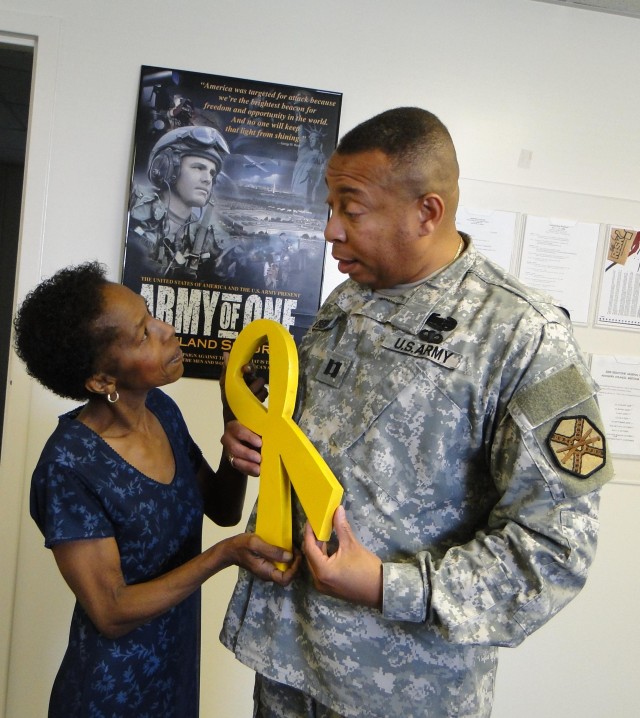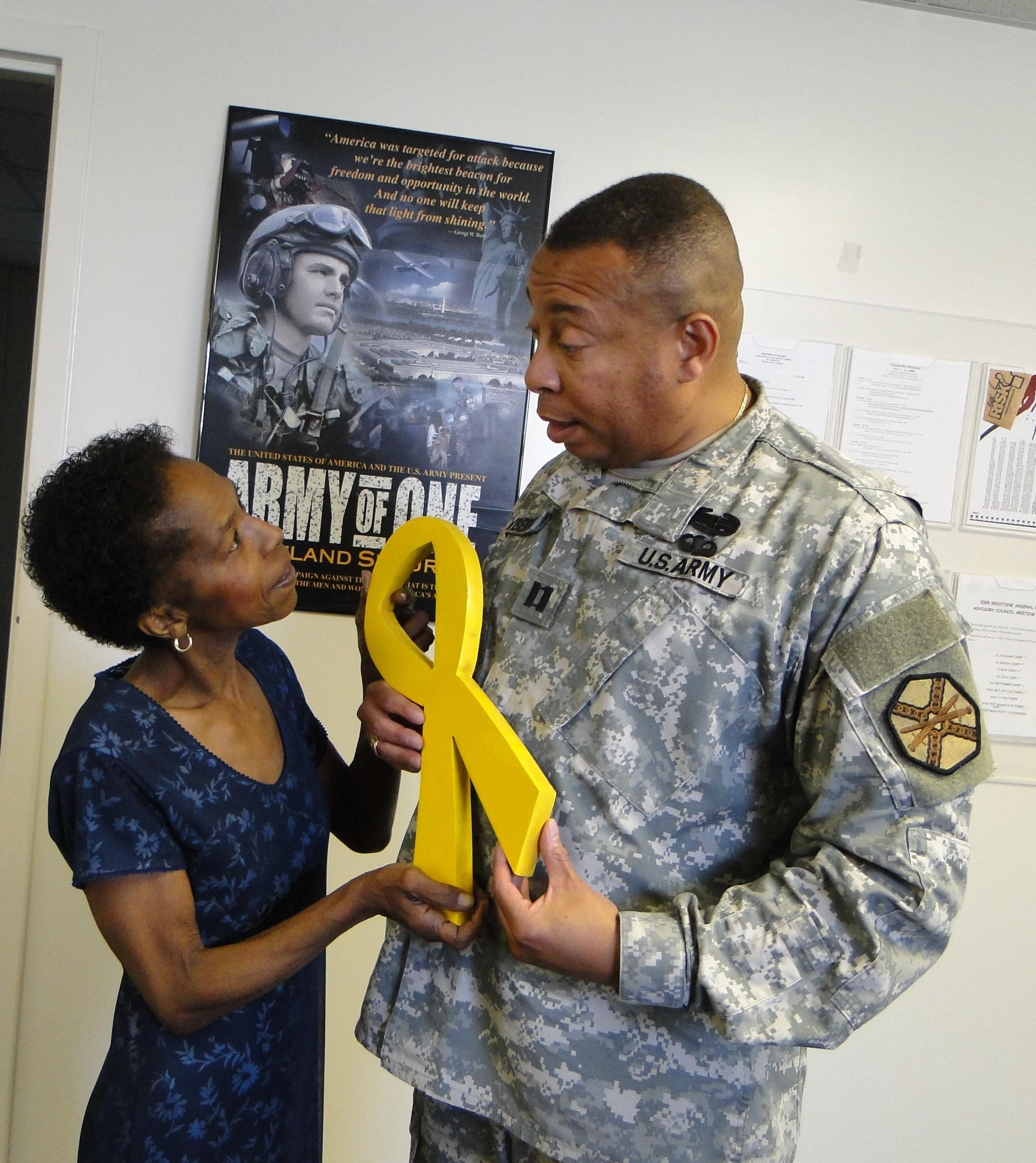
Maj. Gen. Mark Graham's resume reads like a who's who of an aspiring career Soldier - service in Desert Storm, first active duty Army colonel to command a National Guard brigade in peacetime, director of the largest military evacuation following the Hurricane Katrina devastation in New Orleans, deputy commander of the U.S. Army North at Fort Sam Houston, Texas, and currently the commander of Division West and Fort Carson, Colo.
Graham's resume includes numerous other assignments in his 32 years of military service along with numerous awards and decorations.
But, in coming years, Graham may become best known for the losses he and his wife and their daughter have suffered during the past six years - the suicide death of son Kevin, a top ROTC cadet, in 2003, and the death of son Jeff, a second lieutenant, in 2004 as a result of a roadside bomb explosion in Iraq.
Today, Graham and his wife, Carol, are advocates for suicide prevention programs in the Army. The general has turned Fort Carson into a testing ground for new suicide prevention programs. While Carol Graham serves on the board of directors of the Suicide Prevention Action Network, Graham appears at suicide prevention conferences, discusses suicide prevention programs with the Army's top leaders and speaks to groups about suicide prevention as often as his schedule allows.
Graham will bring his message to Redstone Arsenal during Suicide Prevention Month in September. He is slated to speak to two audiences on Sept. 10 at 11 a.m. in Heiser Hall and at 1 p.m. in Bob Jones Auditorium. He is making the local visit at the invitation of Ruby Turner, director of the Employee Assistance Program.
"I saw him and learned about his story in the film 'Shoulder to Shoulder' that we showed during the Arsenal-wide suicide prevention training last spring," Turner said. "So, I e-mailed him and he said he would come to Redstone Arsenal."
The Heiser Hall program will be focused primarily on the Arsenal's young Soldier population, yet it is open to both Soldiers and civilians who have easy access to the hall on Patton Road. The Bob Jones Auditorium program will be directed mainly to the civilian work force, but is open to both employees and Soldiers.
"His message is universal. Anyone working for the Department of Defense in any capacity can attend these programs," Turner said.
The Army annually recognizes September as Suicide Prevention Month, and encourages all Army installations to have programs addressing this issue. This year, many of those efforts at Redstone Arsenal will be focused during the observance of Suicide Prevention Week by the nation and Department of Defense on Sept. 6-12.
This year's Suicide Prevention Month theme within the Army is "Improving Our Soldiers and Families Health: A Healthy Force Combating High Risk Behaviors." The theme conveys the message that the Army is committed to a holistic approach to improving the physical, spiritual and behavioral health of Soldiers, their families and Army civilians.
"There has been an increased emphasis on suicide prevention this year because we have seen an increase in suicides within the Army," Turner said. "In support of that emphasis, we are coordinating a program with General Graham to make people more aware of what they can do to prevent suicides both in the workplace and in their personal lives."
According to Army reports, for the first time the rate of suicides in the military in 2008 exceeded that of the general population - 20.2 per 100,000 people in the military compared to the civilian rate of 19.5 per 100,000. The Army's suicide rate was 12.7 per 100,000 in 2005, 15.2 in 2006 and 16.8 in 2007. During the first Gulf War in 1991, the Army's suicide rate was 14.4 per 100,000.
In 2008, suicides in the Army reached a high of 140. So far in 2009, the number of suicides is 88.
Military officials attribute the increase in suicides to repeated deployments in Iraq and Afghanistan. Other causes could be the uptempo training and pending overseas assignments associated with wartime, the Army's rising divorce rate, military drug and alcohol use, the stigma in the Army associated with seeking assistance with mental-health issues and the weak national economy.
During Suicide Prevention Week, information booths on suicide prevention will be located at the PX/Commissary, Sparkman Center and OMEMS. Yellow ribbons - the symbol for suicide prevention - will be given out for employees to wear. In addition, Turner, employee assistance professional Richard Lewis, and other counseling professionals will be available to speak with groups about suicide prevention.
"Supervisors and employees know we are here, and know we are available to help them at any time," said Turner, who has worked in the Employee Assistance Program for 29 years.
"What we offer here in terms of suicide prevention presentations and services is nothing new to Redstone Arsenal. We've always been here to provide speakers and to help anyone contemplating suicide. What is new is that the Army is changing. At one time, the Army didn't talk about mental illness. It was frowned upon. Today, the Army is looking at mental illness as something that is treatable and manageable when people get the help they need. The Army now would rather treat a person's mental illness than discharge them or fire them. The Army is reaching out and saying 'It's OK. We can treat mental illness.'"
Turner urges anyone contemplating suicide to seek immediate help from their family doctor or a local emergency room physician. People suffering from suicidal thoughts cope better with their condition when they know someone cares about them.
"It's been my experience that if you know you are cared about then you are more likely to get the help you need," Turner said. "You never know what people are going through. All they need is someone who cares and someone who asks them 'How are you doing''"
Although Redstone Arsenal's Soldier numbers are lower than at larger installations, Turner said the Arsenal is not immune to problems with suicide. A civilian work force known for its work in support of weapon systems can also struggle with suicide issues.
"A lot of our employees have real close relationships to what's going on in the war," she said. "There is also the stress of dealing with situations like a helicopter being down or problems with missile firings. We also have civilians who are deploying in support of the war. And there is the daily stress of the work environment and personal issues like financial problems, spouse and children problems, and just life problems. All those kinds of things can contribute to a situation where someone may contemplate suicide."
Turner is hoping the programs planned for Team Redstone during Suicide Prevention Month will continue to raise the awareness of suicide prevention.
"We want to reach out to as many people as we can and get the message to them," she said. "Even if only one person is saved from suicide through what we do, then we have done our job."
For more information about Suicide Prevention Month or to request a suicide prevention presentation or to seek assistance for someone contemplating suicide, call the Employee Assistance Program at 842-0895 or 842-9897.
Other suicide intervention resources include Fox Army Health Center's Behavioral Medicine, 955-888, ext. 1930; Chaplain Services, 842-2174, 842-2176 or 541-6359; Military One Source, 1-800-342-9647; Huntsville/Madison County Mental Health Services, 533-1970; National Suicide Prevention Hotline, 1-800-273-8255; Hope, 1-800-784-2433; and VA Readjustment Counseling Services, 1-800-271-1000.

Social Sharing